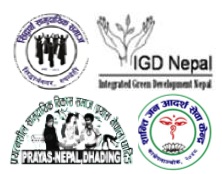Nepal: Better Brick Bridge Schools
Program Supporter: Anonymous Donor
Implementing Partners: Education in Every Home & Self-reliant Development Organization, Integrated Green Development Nepal, Prayas Nepal, and Urban Environment Management Society

As many as 32,000 children labor in unhealthy and unsafe conditions in Nepal’s brick kilns. The informal nature of the industry, which operates on the periphery of communities and with little government oversight, has served to entrench exploitive labor practices such as forced, bonded, and child labor. While work conditions are often harsh, the brick industry provides needed income to the families of these child laborers, and in the wake of the Gorkha Earthquake of April 2015, the sector has become a particularly vital source of jobs and building materials necessary for Nepal’s rebuilding and recovery. This has created a greater urgency to tackle one of the most damaging long-term conditions of Nepal’s brick sector: the stunting of educational opportunity for the children of the kilns.
The brick-making season in Nepal generally runs from November to May. During this time, children of kiln workers withdraw from school and accompany their parents to the kilns, where they remain with their families through the season. With this annual migration and periodic disruption of studies, children of kiln workers fall far behind their peers in schooling and often abandon their studies altogether to support their parent’s work on the kilns. Only a third of children who work in kilns have completed second grade, and a majority simply drop out before finishing primary school. The result is an entrenched cycle of poverty and relegation to low-skilled work for kiln children. In a country absent a viable social safety net and with a high risk of labor exploitation, children of Nepal’s brick kiln workers stand out as some of the world’s most vulnerable people.
The Bridge Schools Program (BSP) was designed to meet the specific needs, seasonal schedules, and academic challenges of the children of Nepal’s migrant kiln workers. BSP provided an educational structure for kiln workers’ children built within the facilities and curriculum of Nepal’s public education system. Working in partnership with Nepal’s Ministry of Education and local education and child welfare NGOs, GFI developed an integrated approach to “bridging” the gap that migrant kiln work creates in a kiln child’s education. The BSP curriculum was designed to work within the seasonal brick-making calendar, and still link up to the national education system’s schedule so that children who migrate to the kilns could return to their home school, current on all of the lessons and requirements, and transition back into their regular local schooling so as to not fall behind their peers. The overall goal was to ensure that the children of Nepal’s migrant kiln workers were encouraged and able to continue their education, and that a greater priority and accessibility for children’s education was established on Nepal’s brick kilns. The BSP worked on the same partner kilns as the Better Brick – Nepal Program and supported approximately 2,000 children a year across 13 districts. Through a partnership with the Better Brick – Nepal Program, the Bridge Schools Program was responsible for eliminating child labor on 17 kilns to date.
–PBS News Hour profiles Better Brick, Bridge Schools – Nepal
–Better Brick, Bridge Schools – Nepal featured in “Nepal’s earthquake: A push to rebuild without child labor”
–Better Brick, Bridge Schools – Nepal featured in “How Nepal is trying to solve its blood brick problem”
–“Better Brick, Bridge Schools – Nepal featured in article on Nepal’s efforts to create child labor-free kilns
